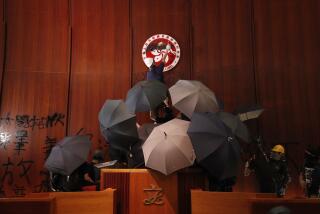Record Turnout in Hong Kong Vote
- Share via
HONG KONG — Voters braved heavy rains and floods Sunday for a record turnout in the first elections in this territory under Chinese rule--less a vote about selecting a new Legislative Council than a referendum on the future of democracy in Hong Kong.
The result was resounding support for Hong Kong’s pro-democracy camp, which was ousted from the legislature after the territory’s return to Chinese sovereignty and replaced by appointed pro-Beijing lawmakers.
Defying expectations of a low turnout and accusations of political apathy, nearly 1.5 million voters ventured out in torrential showers to cast their ballots. Some waded barefoot through high waters, then stepped into polling stations on bridges of sandbags. The 53.3% turnout was the highest ever in Hong Kong, topping the 35.8% who voted in the last election under British rule, in 1995.
“This is a tremendous turnout. This is a tremendous achievement,” said Hong Kong’s chief executive, Tung Chee-hwa, attributing it to people’s confidence in the new government and in Hong Kong’s autonomy from China.
But the biggest winners in the election--some of Tung’s principal critics--read the turnout as a protest against Beijing’s appointed legislature and a desire to have more voice in the government.
“This is a victory for democracy,” said Martin Lee, a 59-year-old lawyer and a vocal critic of Beijing. “The message to me is loud and clear, and that is [Hong Kong people] want and deserve democracy. I think it would be in the interests of the Chinese leaders in Beijing to take heed of that strong message and actually allow us in Hong Kong to establish full democracy.”
Although pocketbook issues have gained importance since Asia’s economic crisis rippled into Hong Kong, the key issue in the election was the pace of democratization.
Only one-third of the 60-member council is directly elected. An additional 30 seats are chosen by professional or corporate groups, and 10 are selected by a small election committee. Under a plan to gradually phase in a fully elected legislature, half the council will be popularly elected by 2007. Then there will be a “review” to determine when full elections should be held.
The democracy camp says the sooner the better. Others, echoing Tung and leaders in Beijing, say there is no rush.
*
Sunday’s elections gave evicted pro-democracy legislators the chance to rejoin the government. As midnight struck on June 30 last year, marking the return of Chinese sovereignty over Hong Kong and the premature end to the elected legislature, Democratic Party Chairman Lee and fellow party members occupied the balcony of the Legislative Council building and vowed that they would return.
On Sunday, they did. In the popular contest, exit polls indicated that Democrats and their allies were the top vote-getters in every district, garnering a projected total of 14 of the 20 directly elected seats. The main pro-Beijing party won only five; the party chairman, who had been projected to lose, won a seat by a thin margin.
In another telling result, the Liberal Party, which represents big-business interests, did not win a single seat by popular vote, the polls indicated.
Although its members apparently swept the popular races, the pro-democracy camp still will not dominate the legislature as it did before the hand-over, when it occupied 27 seats. A new proportional representation system introduced after the Democrats’ 1995 landslide aims to give more seats to less popular parties. Thus, although the Democrats and their allies are expected to win 70% of the popular vote, they will get less than a third of the legislature’s 60 seats.
Pro-business groups and government allies did much better in the two other, “small circle” elections. The self-described pro-Beijing bloc, made up of the Democratic Alliance for the Betterment of Hong Kong and the Hong Kong Progressive Alliance, looked set to win the majority of seats chosen by professional groups or the 800-member election committee, which would allow the bloc to dominate the legislature.
“Such a composition will make it easier for the government to control the legislature on political issues,” said City University professor Ma Ngor. The legislature has much less power than, say, the U.S. Congress. Members cannot even introduce bills affecting public spending or government operations. Tung eliminated the “governor’s question time,” when legislators could publicly query Hong Kong’s top official. China’s parliament can veto laws that the council passes, or even dissolve it altogether.
The body does, however, act as a public sounding board and a moral force that can hold public hearings and call officials to account.
“Voters wanted to choose someone to voice their opinion and challenge the government,” said Joseph Cheng, a political scientist at City University. “Instead of a rubber-stamp legislature, they wanted a check-and-balance mechanism that works.”
More to Read
Sign up for Essential California
The most important California stories and recommendations in your inbox every morning.
You may occasionally receive promotional content from the Los Angeles Times.













